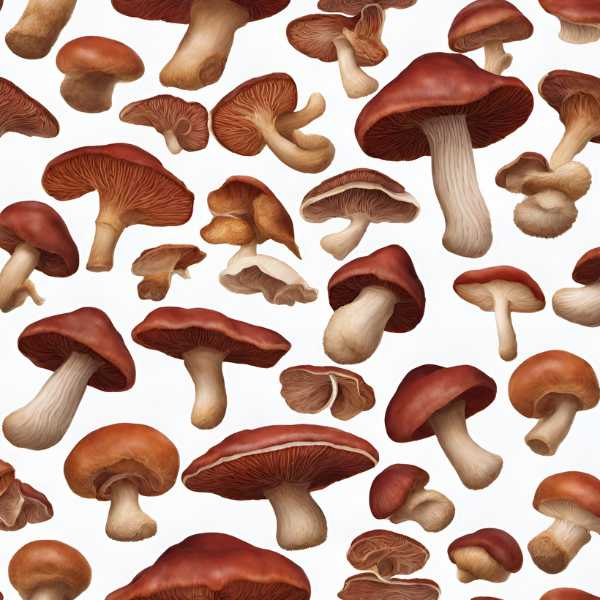Yes, Dogs can eat Reishi Mushrooms but moderation is required. While Reishi mushrooms offer potential advantages such as immune system support and potential anti-cancer properties, proper care is very important when feeding Reishi Mushrooms to your pet.
Overall, while Reishi mushrooms may hold a special place as a nutrient for dogs, it’s important to prioritize your dog’s safety and consult with a professional before making any dietary changes.
Nutritional Composition of Reishi Mushrooms
| Component | Amount in 100mg |
|---|---|
| Carbohydrates | 26-28mg |
| Crude Fat | 3-5mg |
| Crude Fiber | 59mg |
| Crude Protein | 7-8mg |
| Ash | 1.8mg |
| Polysaccharides | Approx. 400mg |
Benefits of Feeding Your Dog Reishi Mushrooms
Immune System Support: Reishi mushrooms are rich in polysaccharides and beta-glucans, which may boost your dog’s immune system, protecting them lot of infections and illnesses.
Anti-Inflammatory Properties: The triterpenes in Reishi mushrooms have anti-inflammatory properties, potentially helping in the management of inflammatory conditions in dogs, such as arthritis.
Adaptogenic Effects: This can be particularly beneficial in managing the effects of stress and anxiety in dogs.
Antioxidant Boost: The presence of antioxidants in Reishi mushrooms may help in reducing oxidative stress, supporting overall cellular health in dogs.
Potential Cancer Support: Some studies suggest that Reishi mushrooms might have anti-cancer properties. While further research is needed, incorporating Reishi into the diet could be considered as part of a comprehensive approach for dogs with cancer.
Cardiovascular Health: Reishi mushrooms may contribute to cardiovascular health by helping regulate blood pressure and cholesterol levels in dogs.
Digestive Support: The fiber content in Reishi mushrooms can aid in digestion and promote a healthy gut, contributing to better overall digestive health for your dog.
Potential Risks of Feeding Your Dog Reishi Mushrooms
Although there are potential benefits to giving your pup Reishi mushrooms, there are also risks associated with it.

1. The mushroom contains ganoderma lucidum which can cause gastrointestinal distress in some breeds of dogs.
2. If your dogs eat too much of these, it can be toxic and lead to liver damage.
3. Reishi mushrooms may interact with certain medications that your dog is taking and could potentially have adverse effects.
Tips for Feeding Reishi Mushrooms to Your Dog
If you’re considering feeding your dog Reishi mushrooms, there are some safety tips to keep in mind.

Always talk to your veterinarian before giving your pup any new food item.
You should start feeding reishi mushrooms slowly and in small amounts. It should be given as an occasional treat once or twice a week.
Because the mushrooms can interact with certain medications, always let your vet know if you plan on giving them to your pet.
